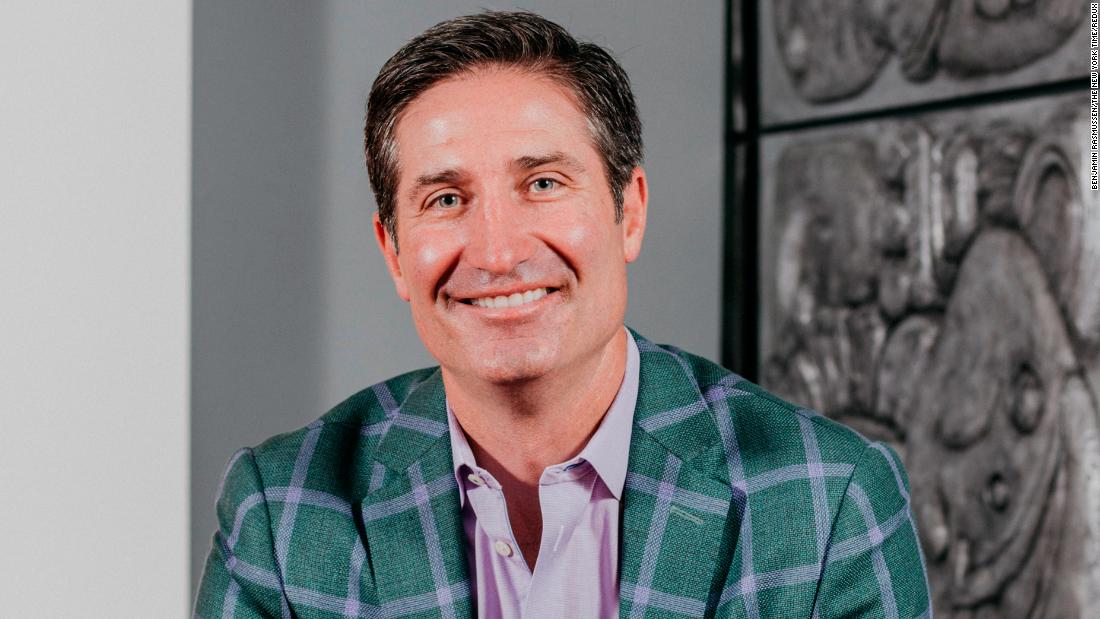Brian Niccol’s Career Trajectory and Impact

Brian Niccol’s career path is marked by a consistent rise through leadership roles in the food and beverage industry, characterized by a focus on innovation and driving profitable growth. He has held key positions at several major companies, leaving a lasting impact on their financial performance, brand development, and overall industry landscape.
Impact on Financial Performance
Niccol’s leadership has consistently resulted in significant financial growth for the companies he has worked for. His ability to understand consumer trends and implement strategic initiatives that resonate with the market has been instrumental in driving revenue and profitability.
- At Taco Bell, Niccol oversaw a period of sustained growth, with annual sales increasing from $7 billion to over $10 billion during his tenure. He spearheaded the development of new menu items and digital ordering platforms, contributing to a 20% increase in system-wide sales.
- As CEO of Domino’s Pizza, Niccol implemented a digital-first strategy that resulted in a dramatic increase in online ordering and delivery, contributing to a 15% rise in global sales in just three years.
Impact on Brand Development, Brian niccol salary
Niccol has a proven track record of revitalizing brands and driving positive brand perception. His focus on innovation and customer-centricity has resulted in a shift towards modern, digitally-driven experiences that resonate with today’s consumers.
- Niccol’s leadership at Taco Bell was marked by a shift towards a more modern and edgy brand identity. He introduced new menu items, like the Doritos Locos Tacos, that appealed to a younger audience and contributed to a significant increase in brand awareness and customer loyalty.
- At Domino’s Pizza, Niccol’s focus on digital innovation and customer service led to a dramatic improvement in brand perception. He spearheaded initiatives like the “Pizza Tracker” and “Domino’s AnyWare” platforms, which made ordering and delivery more convenient and enjoyable for customers.
Significant Innovations and Strategies
Niccol is known for his forward-thinking approach and his ability to identify and implement innovative strategies that drive growth.
- At Taco Bell, Niccol spearheaded the development of the “Dollar Cravings Menu,” which offered value-driven options and contributed to a significant increase in customer traffic. He also introduced the “Taco Bell Live Mas” campaign, which emphasized the brand’s unique culture and personality.
- At Domino’s Pizza, Niccol implemented a digital-first strategy that transformed the company’s ordering and delivery process. He introduced the “Pizza Tracker” app, which allowed customers to track their orders in real-time, and the “Domino’s AnyWare” platform, which enabled ordering through a variety of digital channels, including voice assistants and smart home devices.
Compensation and Salary Trends in the Fast-Food Industry

Brian Niccol’s compensation as CEO of Domino’s Pizza is a reflection of the broader trends in CEO compensation within the fast-food industry. While his salary is substantial, it’s important to understand the factors that contribute to such high compensation packages and how they compare to other major players in the sector.
Comparison of Brian Niccol’s Salary to Industry Average
Brian Niccol’s compensation is significantly higher than the average compensation for CEOs in the fast-food industry. According to a 2022 study by Equilar, the median total compensation for CEOs of publicly traded fast-food companies was $12.7 million. However, Niccol’s total compensation in 2022 was $21.5 million, exceeding this median by a considerable margin. This difference highlights the significant influence of factors such as company performance, size, and market position on CEO compensation.
Factors Influencing CEO Salaries in the Fast-Food Industry
Several key factors contribute to the high salaries of CEOs in the fast-food industry:
- Company Performance: CEOs who drive strong financial performance and growth are often rewarded with substantial compensation packages. This includes factors like revenue growth, profitability, and stock price performance.
- Company Size: Larger fast-food chains with extensive operations and market share tend to offer higher compensation packages to their CEOs. This is partly due to the increased responsibility and complexity of managing a larger organization.
- Market Competition: The fast-food industry is highly competitive, and companies often need to attract and retain top talent, particularly at the executive level. This competitive landscape can drive up CEO salaries as companies strive to attract and retain the best leaders.
- Shareholder Expectations: Shareholders expect strong returns on their investments, and they often influence the compensation packages offered to CEOs. This includes performance-based bonuses and stock options that align CEO incentives with shareholder interests.
Examples of CEO Compensation Packages in Other Major Fast-Food Chains
Here are some examples of CEO compensation packages in other major fast-food chains:
- McDonald’s: In 2022, CEO Chris Kempczinski’s total compensation was $23.3 million. His compensation package includes a base salary, annual bonus, and stock options. His compensation is driven by McDonald’s strong financial performance and global presence.
- Starbucks: In 2022, CEO Howard Schultz’s total compensation was $20.5 million. His compensation package is influenced by Starbucks’ global brand recognition, strong revenue growth, and commitment to sustainability initiatives.
- Yum! Brands: In 2022, CEO David Gibbs’ total compensation was $14.6 million. His compensation package is driven by Yum! Brands’ successful franchise model and strong financial performance across its various brands, including KFC, Pizza Hut, and Taco Bell.
These examples illustrate the variety of factors that influence CEO compensation packages in the fast-food industry. While there is a general trend towards higher compensation, specific factors such as company size, performance, and market competition play a significant role in determining the overall compensation level.
Public Perception and Criticism of CEO Compensation: Brian Niccol Salary

The public often scrutinizes the compensation of CEOs, especially in industries like fast food, where the gap between executive pay and employee wages can be stark. This scrutiny stems from a complex interplay of factors, including the perceived fairness of pay, the role of CEOs in driving company performance, and the broader societal implications of wealth inequality.
Public Sentiment Towards High CEO Salaries
Public sentiment towards high CEO salaries, particularly in the fast-food industry, is often characterized by a mix of resentment, skepticism, and a sense of injustice. The perception that CEOs are overpaid while employees struggle with low wages and limited benefits fuels this sentiment. For example, a 2023 survey by the Pew Research Center found that 72% of Americans believe CEO pay is excessive, with this sentiment being particularly strong among those who earn less than $50,000 annually. This sentiment is further amplified by the perception that fast-food companies prioritize profits over employee well-being, evidenced by the frequent occurrence of low wages, limited benefits, and demanding working conditions.
Arguments For and Against High CEO Compensation
The debate surrounding high CEO compensation is multifaceted, with valid arguments presented on both sides.
Arguments for High CEO Compensation
- Shareholder Value: Proponents of high CEO compensation argue that it is essential for attracting and retaining top talent, who can drive shareholder value through strategic decision-making and effective leadership. This perspective posits that a high salary acts as a motivator for CEOs to prioritize maximizing returns for shareholders. They argue that CEOs are responsible for overseeing large, complex organizations and that their decisions have a significant impact on the company’s financial performance. Therefore, they deserve to be compensated accordingly for their expertise and risk-taking.
- Corporate Performance: Another argument in favor of high CEO compensation centers on the link between executive pay and corporate performance. Studies have shown a positive correlation between CEO compensation and company profitability, suggesting that high-paying companies tend to perform better financially. This argument emphasizes the importance of aligning CEO incentives with shareholder interests, arguing that high pay incentivizes CEOs to prioritize long-term growth and profitability.
Arguments Against High CEO Compensation
- Social Responsibility: Critics of high CEO compensation argue that it is ethically problematic, particularly in industries like fast food where workers often struggle with low wages and limited benefits. They argue that CEOs are not solely responsible for company performance and that factors like market conditions and industry trends play a significant role. Additionally, they highlight the disproportionate impact of CEO compensation on wealth inequality, arguing that it exacerbates the gap between the rich and the poor. Critics advocate for more equitable pay structures that prioritize fair wages for all employees and encourage greater social responsibility from corporations.
- Lack of Correlation: Research has also shown that the correlation between CEO compensation and company performance is not always clear-cut. Some studies have found that CEO pay does not necessarily translate into better financial performance, suggesting that other factors may be more important in driving company success. This argument casts doubt on the justification for high CEO compensation based solely on the notion of aligning incentives with shareholder value.
Comparison of CEO Compensation in the Fast-Food Industry
| Company | CEO | Total Compensation (2023) |
|---|---|---|
| McDonald’s | Chris Kempczinski | $23.2 million |
| Starbucks | Laxman Narasimhan | $19.4 million |
| Yum! Brands | David Gibbs | $17.8 million |
| Domino’s Pizza | R. J. Sinegal | $14.5 million |
| Chipotle Mexican Grill | Brian Niccol | $13.6 million |
Brian niccol salary – While Brian Niccol’s salary as CEO of Domino’s Pizza is likely a reflection of his success in the business world, it’s important to remember that every dollar earned represents a story. The story of brian nichols , for example, reminds us that even in the face of adversity, hope and resilience can prevail.
Perhaps, in considering Brian Niccol’s financial success, we can also consider how to use our own resources to create positive change in the world.